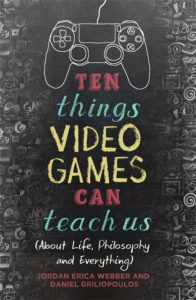
10 Things Video Games Can Teach Us (About Life, Philosophy and Everything)
Authors: Jordan Erica Webber and Daniel Griliopoulos
Genre: Nonfiction
Publisher: Robinson
A Review by Mark Jones.

Before reading 10 Things Video Games Can Teach Us (About Life, Philosophy and Everything), I knew nothing about philosophy. And, let’s not pretend otherwise, it is very much a book about philosophy and how video games reference philosophical ideas. Fortunately, the book serves very well as Philosophy 101.
10 Things Video Games Can Teach Us is a book of two halves. Jordan Erica Webber and Daniel Griliopoulos have each written five chapters about the basics of philosophy and how some video games reference these concepts.
Webber starts at the very beginning. She teaches us the language and processes for considering the basics of philosophy. What are thought experiments, why do philosophers use them, and can video games improve them? How do we “know” something, and does knowing something correct for incorrect reasons matter? What is the self, and what happens to it in a virtual world?
I really enjoyed these chapters. Each new concept is given space to settle and enough examples to be understood easily. The complexity of the topics tends to follow the historical development of the relevant ideas. It was interesting to see how the philosophers I had only heard of in passing fit into the bigger picture. From Socrates and Plato to John Stuart Mill and Friedrich Nietzsche, a lot of ground is covered.
Crossing into the second half of 10 Things Video Games Can Teach Us I found some of the descriptions less satisfying. Partly this is a by-product of the topics that the authors introduce. As the themes become more complicated and build on the earlier chapters, they are harder to explain succinctly. The chapters on free will, duty, virtue, and utilitarianism were still educational, but I found myself having to re-read sections more often to fully understand them. This is to be expected and shows that the authors aren’t happy sticking to easy or simple concepts.
The final chapters on politics and death are a return to the strength of earlier chapters. They focus on philosophical lessons and the video games that approach them in interesting ways. While discussing death, Griliopoulos looks at games that try to reinstate the importance of death. Whereas the majority of video games simply treat death as a minor setback or necessary outcome, he looks at games like the free, Flash game You Only Live Once. In this game, each player can only play once and will be left with their outcome forever (within certain technical restrictions). Of course, players don’t necessarily play games for philosophical lessons and some of the responses are less than favourable.
10 Things Video Games Can Teach Us (About Life, Philosophy and Everything) faces an unenviable task of covering so many aspects of humanity. However, it manages to introduce the topics, the history of philosophy, and the relevance of video games in an easy to read and entertaining manner. The discussions with game creators add another dimension. Seeing how these teams were aware of the philosophies when building their games has peaked my interest for games I hadn’t played.
Verdict
It depends. I enjoyed 10 Things Video Games Can Teach Us and I feel like I’ve gained a basic understanding of some philosophical ideas. However, it’s a pop-sci book at heart. While entertaining, if you already have some relevant knowledge, it will suffer from only lightly applying them to video games. It may not dive as deeply into games as you would like.

![[PODCAST] THE COMICS AGENDA: THIS USED TO BE A FUNHOUSE, NOW IT’S FULL OF EVIL CLOWNS](https://geekd-out.com/wp-content/uploads/2017/11/comics-agenda-2-150x150.jpg)

